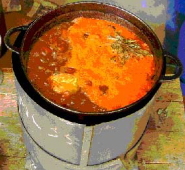Context
Wood charcoal and firewood remain widely used fuels in Africa, mainly for cooking. In dry areas, the consumption of these fuels widely exceeds the capacity of production of forests. In the North of Senegal, the intensive farming of rice and its transformation lead to big quantities of wastes (6 to 10 000 tons of rice husk per year).The agglomeration technique developed at the CRA-W makes it possible to produce fuel balls from biomass mixed with clay and water by means of a simple production unit. These balls are then dried in the sun on riddles, before being commercialized in hermetic plastic bags. Their behaviour during combustion is similar to the one of wood charcoal and their utilization on a large scale would allow a decrease of the pressure on forests. Indeed, by comparing the consumption of balls with the one of wood charcoal for the cooking of different Senegalese traditionnal dishes, it prooves that 1 kilo of biomass treated this way replaces 10 kilos of standing timber with a 60 % moisture content, that is, 6 kg of dry wood, changed into wood charcoal.
[image]
Objectives
The Bio-terre project financed by the International Relations Directorate of the Walloon Region mainly aimed to study the production and acceptability of the fuel, as well as the collect of information necessary for the techno-economic assessment and the industrial repeatability of the project with other biomass sources.Description of tasks
The assessment mission carried out by the CRA-W in July 2001 selected the site of Ross-Bethio. The BIO-TERRE project was then divided into two phases :A preliminary phase carried out in 2003 at the CRA-W Gembloux to adapt the agglomeration technology to the rice husk and study the bases of a furnace fitting this fuel ;
the second testing phase on an experimental pilot unit installed in Ross Bethio, took place from January to June 2004. This phase concerned :
- the optimization of the manufacturing technique ;
- the optimization of the fuel when being used to cook different Senegalese dishes, comparative tests with wood charcoal ;
- the optimization of the furnace for this new fuel : lighting, power, duration of combustion, fuel consumption ;
- the production of two tons of fuel distributed among 30 families to carry out
the acceptability test.
Results obtained
Manufacturing of the fuel : the local raw materials and the basic equipment provided by the project make it possible to produce a performing fuel.Drying in the sun : tests show that drying can be carried out by keeping fuel balls in the sun for less than 24 hours.
Cooking with balls in comparison with wood and wood charcoal. The cooking of thieboudienne (typical Senegalese dish, preparation for 10 persons) requires 2,5 to 3 kg of balls if used in the appropriate furnace, that is, at 50 FCFA per kilo (100 FCFA = 0,15 €), 125 to 150 FCFA, compared with 120 FCFA for gas, 180 FCFA for wood and 300 FCFA for wood charcoal.
The acceptability of the fuel,according to the survey, is beyond all our hopes : at 50 FCFA per kilo, 90 % of the housewives want to use Bio-terre exclusively instead of wood charcoal and gas.
Economic feasibility : this technology requires investments we can describe as “low” compared with other energy conversion techniques.
In the project area, the necessary investment for the installation of a factory (field, buildings, vehicle, equipments, etc.) corresponds to about 90 millions of FCFA (137 000 €) and the production cost would be close to 30 FCFA/kg (45 €/ton) for a production yield of 4000 tons per year.
Furnaces : in order to reach an optimal efficiency, fuelballs require the use of a furnace specially developed with this aim by the CRA-W.
Main interest of the technology : Used as a substitute for wood charcoal aimed at domestic fuel, this product leads to an important economy : 1 kg of biomass treated this way can save from 6 to 10 kg of standing timber, that is a specially interesting ratio in the framework of environmental protection.
Within the firewood problematic in DC, this technology would also have an appreciable social impact : the fuel can be sold retail at about 50 FCFA/kg, while the wood charcoal pot (750 gr) is sold at 150 FCFA, that is 200 FCFA/kg.
Partners
Wallonia-Brussels Delegation, SAED - National Society of Development and Exploitation of the land of the Senegal river Delta and of the Senegal river valleys and of the Falèmé,DPDR -St Louis of Senegal,SAED - Dagana Delegation - Ross Bethio,
PROGEDE Energy Directorate : durable and participative management programme of traditional and substitution energies - Energy Directorate – Dakar, Peytavin,
CERER - Study and Research Centre on Renewable Energies - Dakar.
CRAT - African Technology Centre - Dakar.
CRAW off coordinator
TEMMERMAN Michaël (Attaché scientifique)Département Génie rural
Chaussée de Namur, 146
B-5030 Gembloux
Téléphone direct :62 71 57
Téléphone département :+ 32(81) 61 25 01
Fax département :+ 32(81) 61 58 47
E-mail :temmerman@cra.wallonie.be
Funding
- SPW - DG Foreign policies

